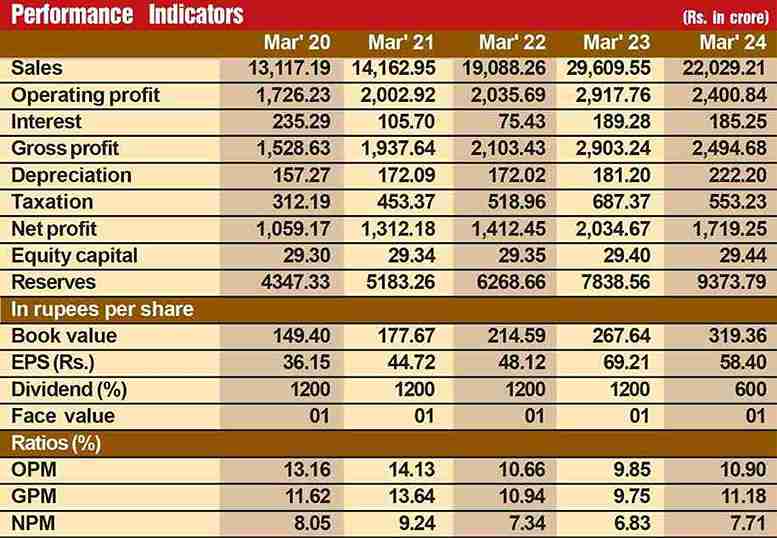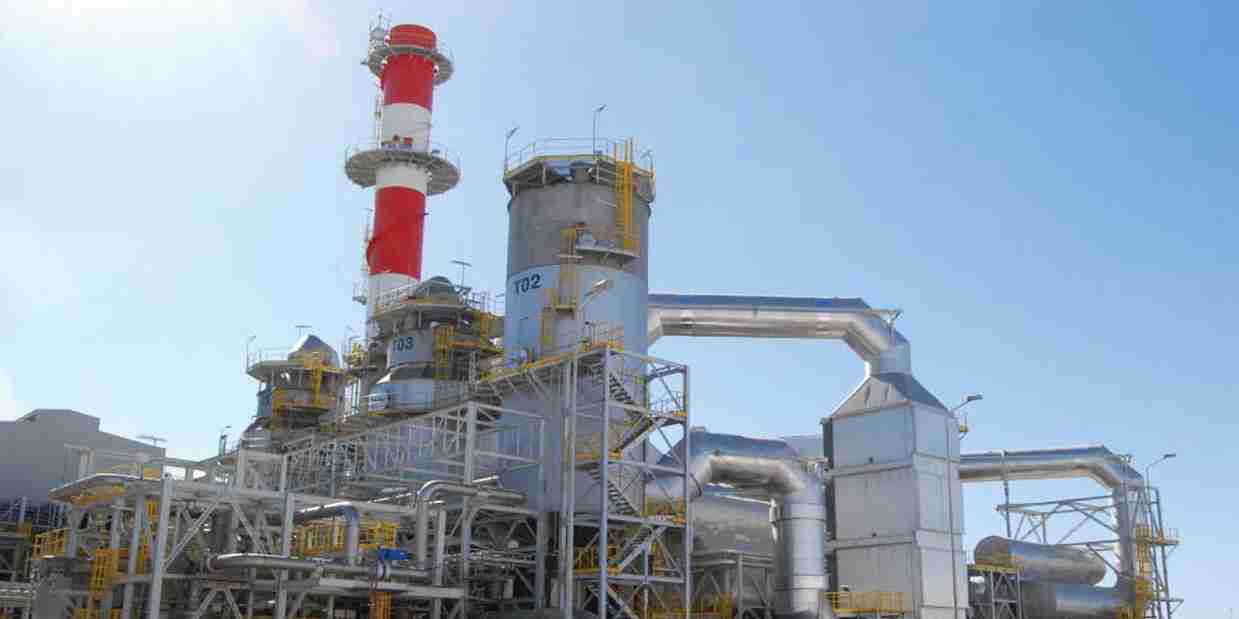Fortune Scrip
Published: November 30, 2024
Updated: November 30, 2024
Coromandel International Ltd
Century Of Serving Indian Farmers
For this fortnight, we have picked Coromandel International, a century-old agrochemicals company
which manufactures crop protection products. Formerly a fertiliser company styled ‘Products and
Advisory Services’, the company manufactures fertilisers, pesticides and speciality nutrients.
Starting its operations from India’s first fertiliser plant at Ranipet in Tamil Nadu in 1906, the
company has evolved over the course of a century to offer diverse products, customised farm
solutions and advisory services across the farming value chain. Its ‘Farmer First’ approach, quality
focus and consumer-connect initiatives have helped it gain farmers’ trust, and have established its
brand ‘Growmor’ amongst the most trusted brands in the country.
The trust built over a century has catapulted Coromandel to the position of India’s largest private
sector phosphatic fertiliser company and the world’s largest neem-based bio-pesticide manufacturer.
VALUE CHAIN
Originally set up by IMC and Chevron companies and EID Parry of south India’s well-known
Murugappa group, Coromandel operates a retail business in the states of Andhra Pradesh, Karnataka
and Maharashtra through its ‘Mana Growmor’ centres which have crossed the 750 mark by now.
The company has 16 manufacturing plants located in Andhra Pradesh, Tamil Nadu, Maharashtra,
Gujarat, Rajasthan, Madhya Pradesh, Uttar Pradesh and Jammu & Kashmir. Its product line includes popular brands like Growmor, Godavari, Paramfos, Parry Gold and Parry Super. Besides products like phosphatics fertiliser, the company manufactures and markets speciality
nutrients which focus on products such as sulphur pastilles, water-soluble fertilisers and secondary
and micro-nutrients. It also offers organic fertilisers and bio-pesticides. In order to serve farmers, the
company operates a network of around 800 retail outlets across Andhra Pradesh, Telangana,
Karnataka and Maharashtra. Through these outlets, it offers farming services, including crop advisory, soil testing and farm mechanisation, to some 3 million farmers.
TIP-TOP FINANCES
Coromandel has made rapid strides on the financial front. During the last 12 years, its sales
turnover has more than doubled from Rs 9,034 crore in fiscal 2013 to Rs 22,058 crore in fiscal
2024, with operating profit trebling from Rs 770 crore to Rs 2,380 crore and net profit spurting
almost four times from Rs 434 crore to Rs 1,641 crore. The company’s balance sheet is extremely
healthy and shows a very sound financial position. As of March 2024, reserves stood at Rs 10,126
crore – almost 350 times its equity capital of Rs 29 crore. Its debt is negligible, with an interest
burden of only Rs 187 crore in comparison to a sales turnover of Rs 22,058 crore.
But we have not picked this company as the Fortune Scrip because of its past laurels. We
strongly feel that its prospects going ahead are all the more promising. Consider:
EARNINGS TARGET
- The company continues to perform well and the management is confident of maintaining
EBITDA/MT at Rs 5,600-6,000 going forward. Well-known brokerage house Prabhudas Lilladher
has increased its FY25 EPS estimate by 4 per cent, citing better margins in the fertilisers business and
a falling raw material cost scenario. Reflecting the positive outlook, the company has put up a gratifying
show in the first half of the current fiscal (2025), with the sales turnover grossing Rs 12,146 crore, gross
profit amounting to Rs 1,502 crore and net profit Rs 1,027 crore. Going forward, the management
remains confident of achieving 10% yoy growth in manufactured products with a sustainable EBITDA/
MT within the Rs 5,600/6,000 range, largely aided by (a) a better product mix; (b) benefits of backward
integration in phosphoric acid, sulphuric acid and rock phosphate, and (c) throughput at plants.
- Little wonder, Prabhudas Lilladher expects to report stable margins for a longer term backed by
(a) efficient sourcing of raw materials; (b) benefits of backward integration; (c) a rising share of unique
grades to overall manufactured volumes; (d) product innovation and capacity expansion in both businesses, and (e) enhanced focus on product branding, both in the nutrition and the CP segment.
CAPEX PLAN
- The company has chalked out an ambitious capital expenditure programme of Rs 2,000
crore to be spent on (a) the fertiliser business (Rs 700/800 crore) and (b) the CPC business (Rs 1,000
crore). The fertilisers business capex includes (a) Rs 400 crore expansion of sulphuric acid at Vizag;
(b) debottlenecking activities in fertiliser plants, and (c) capacity expansion of the SSP granulation
plant. As far as the CPC business is concerned, the capex includes (a) a 50-acre land parcel in Dahej
and (b) 3 new MPPs. The management is also looking at organic and inorganic opportunities for
growth in the medium term. The company is also getting into Nano-DAP with a capacity of 40 mm
bottles. All these expansion plans will boost the top as well as bottomline of the company.
- The company's CDMO business is gaining traction. The management has highlighted that
it is receiving good enquiries from Japanese and European innovators for the contract manufacturing
business, which is likely to contribute meaningfully to overall revenues in the next 18 months.
BRAND FOCUS
- Coromandel is focusing on new launches with an enhanced focus on branding in the nonsubsidy business. These new launches, coupled with branding of their products, both in the crop
nutrition and crop protection segments, are likely to reap rich benefits in the medium to long term.
The company continues with its endeavour to invest in R&D, expansion in distribution reach and
identifying newer off-patented molecules. The management is looking to introduce new products in
the speciality chemicals segment in subsequent quarters.
- The company has already purchased a 50-acre land parcel of land at Dahej in Gujarat for
greenfield projects in CPC. Out of these business proposals, the first one is fungicide, which is at the
final stage of approval. The second is MPP-Dahej - an existing facility for fungicide -- and the third is
for herbicide's newly acquired land at Dahej. These businesses have identified 18 molecules which
are off-patented. It would take 18-24 months to be completed from the date of announcement.
ROLE OF DRONES
- In addition to strengthening its core business activities, Coromamdel is focusing on new
opportunities in adjacent and step-out areas. As part of this approach, it acquired a majority stake in
Dhaksha Unmanned Systems Pvt Ltd, a Chennai-based differentiated drone start-up. Dhaksha has
emerged as a leading player in the drone space in India, providing a complete range of unmanned
aerial systems technology solutions across agriculture, defence, surveillance and enterprise applications. Dhaksha has received an order for 400 drones from ISCO for emerging areas. Dhaksha can
also supply drones to the defence sector but this will happen in the later stages of the company's
evolution. According to the management, this investment in Dhaksha is very future- oriented. The
company will use drones for its liquid fertiliser, speciality nutrient and crop protection business.
Coromandel's role is to support them to reach scale in the next one to two years.
The company's shares are in demand and of late the stock price has shot upto Rs. 1838 before
settling around Rs.1768, outperforming the industry average and Sensex. We feel a lot of steam has
been left as yet and discerning investors can certainly add these stocks in their portfolio as the stock
price has remarkable chance of appreciation going ahead.

![]() Unlock Unlimited Access
Unlock Unlimited Access







![]() Unlock Unlimited Access
Unlock Unlimited Access

